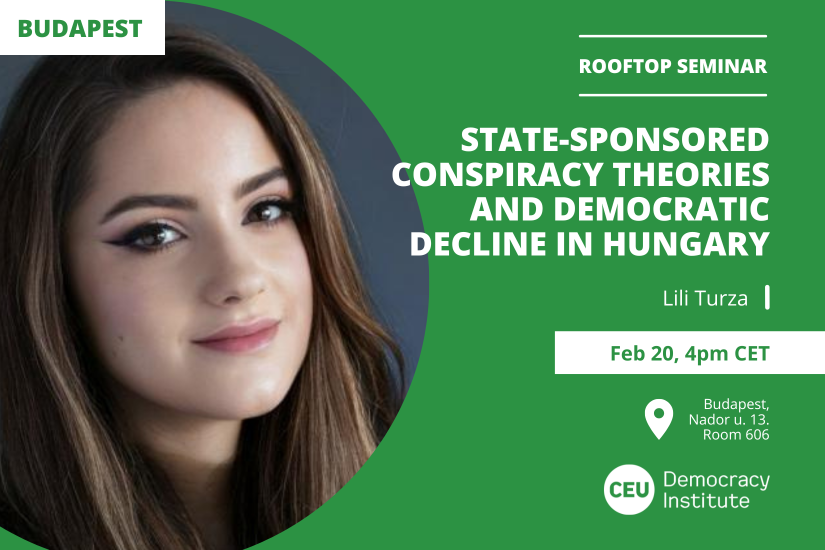
The De- and Re-Democratization Workgroup of the CEU Democracy Institute cordially invites you to its next Rooftop Seminar.
If you would like to attend, please register here.
Please keep in mind that external guests will not be able to enter the building without prior registration.
Conspiracy theories assert that powerful, omnipotent agents are acting in concert to orchestrate a clandestine plot with a sinister goal at the expense of lesser powerful groups – let it be nations, institutions, or cultural, religious, ethnic and political communities. Given their deeply contrarian character, their eagerness to unmask hidden power abuses by various kinds of elites, and their mobilizational potential, they are often associated with (mostly right-wing) populist political projects. Recent years have seen a heightened academic interest in populist-conspiracist political leaders in power and their autocratic tendencies, although there still is a lack of in-depth research on the increasing role conspiracy theories play in governmental political practice and de-democratization processes.
The paper aims to tap into this research gap by exploring the relationship between state-propagated conspiracy theories and democratic decline in the context of Hungary. Under the Orban regime, conspiracist tropes are hardly relegated to the political fringes and do not constitute as fleeting occurrences: they occupy mainstream positions as politicians and pro-government elites regularly draw on anti-Sorosism, anti-woke utterances, problematizations of “gender ideology” and “Cultural Marxism” and the ever-recurring “great replacement” conspiracy theory. The paper argues for treating the governing Fidesz party (and related political and elite actors) as an epistemic community, where conspiracist knowledge claims are meant to serve the Hungarian government’s hegemonic project. They function as justifications for the regime’s institutional takeovers and power grab mechanism. The paper is part of a larger research project and presents some key theoretical and ethnographic insights.
The paper is available at request from the author.
Speaker:
Lili Turza is a Junior Research Affiliate at the DI, and a Ph.D. candidate at the Institute of Political Science at the University of Tübingen. Her doctoral research on the relationship between populism and conspiracy theories in the political communication of right-wing parties in Hungary, and the social significance of conspiracism in mainstream Hungarian political discourse is part of the ERC-funded ‘PACT: Populism and Conspiracy Theory’ project. She holds an M.A. in Nationalism Studies from Central European University (2020) and a B.A. in International Relations from the Corvinus University of Budapest (2018). Her main areas of interest include conspiracy theories, populism, nationalism, citizenship studies, political sociology, and interpretivist research methods in political science.
Discussant:
Andras Szalai is Associate Professor at the Department of International Relations and European Studies of Eotvos Lorand University (ELTE), and a Research Affiliate at the DI. His current research deals with right-wing populism’s narrative construction of security threats, the symbolic use of borders in mitigating ontological insecurities, and the securitization of migration as a societal control mechanism. His general research interests include securitization theory, constructivist theories of European foreign policy, and epistemic power in security expertise. His work has appeared in outlets such as International Relations, Millennium, and the European Review of International Studies.
Chair:
Carlos Melendez is an OSUN Post-doctoral Fellow at the DI, and Professor at Universidad Diego Portales (Chile). He has a PhD in Political Science from the University of Notre Dame, United States, and was previously Visiting Professor at Facultad Latinoamericana de Ciencias Sociales – FLACSO-Ecuador, Pontificia Universidad Javeriana de Colombia, Universidad San Francisco de Quito (Ecuador), and Pontificia Universidad Católica del Perú, among others. His academic work has been published in various prestigious journals, and he has contributed to publications edited by Cambridge University Press and Oxford University Press. He is a regular columnist in La Tercera in Chile and a partner of 50+1 Political Analysis Group (Peru).